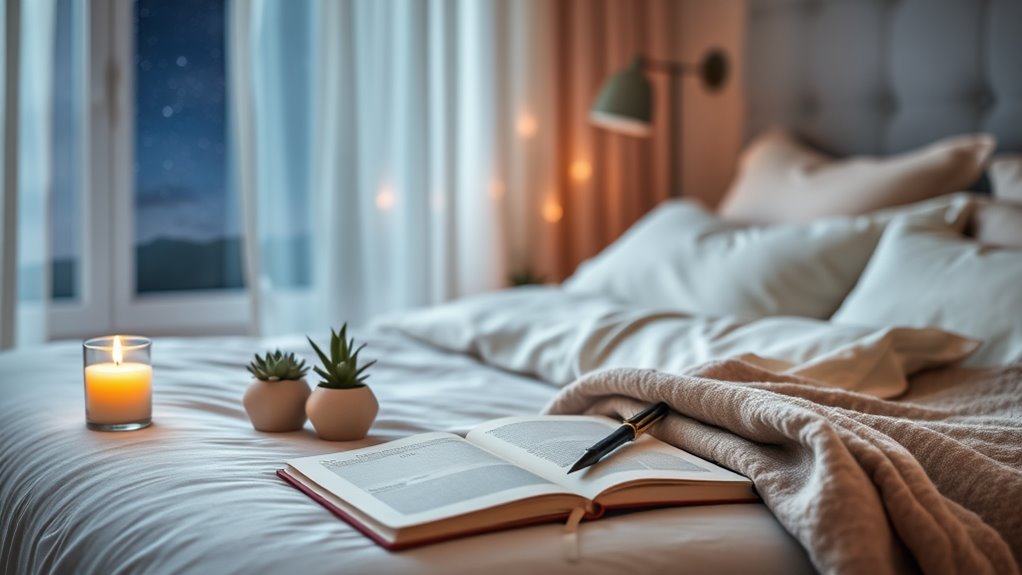To improve your rest, incorporate mindfulness practices like deep breathing and gentle stretching into your bedtime routine. Focus on your breath to release stress and try simple yoga poses to relax your body. Create a calming sleep environment with soothing sounds and aromatherapy. Limit screen time an hour before bed to enhance melatonin production. A consistent routine signals your body it’s time to wind down. There are even more effective techniques you can explore for better sleep.
Nomad Highlights
- Establish a consistent bedtime routine with calming activities like reading and sipping herbal tea to signal your body it’s time to sleep.
- Practice deep breathing techniques, such as inhaling for 4 seconds, holding for 4, and exhaling for 6, to promote relaxation.
- Engage in gentle stretching or yoga before bed to relieve physical tension and prepare your body for restful sleep.
- Create a calming sleep environment with soft music, nature sounds, and blackout curtains to enhance relaxation and comfort.
- Limit screen time at least one hour before bedtime to improve melatonin production and enhance overall sleep quality.
Understanding Mindfulness and Sleep

As you wind down for the night, understanding the connection between mindfulness and sleep can greatly enhance your bedtime routine.
Mindfulness, defined as the practice of being fully present and aware in the moment, plays an essential role in improving sleep quality. By focusing on your breath and letting go of daily stressors, you create a mental space conducive to restful sleep. Incorporating ankle resistance bands into your evening routine can also help release physical tension and promote relaxation.
Recognizing sleep’s importance for overall health, you’ll find that integrating mindfulness techniques can help reduce insomnia and promote deeper relaxation. Incorporating herbal sleep teas into your evening routine can further enhance this calming experience.
As you cultivate this awareness, you’ll likely notice a shift in your ability to fall asleep and stay asleep.
Embrace mindfulness as a powerful tool to transform your nights into a sanctuary of restorative rest.
Establishing a Consistent Bedtime Routine

When you establish a consistent bedtime routine, you’re not just signaling to your body that it’s time to sleep; you’re also creating a powerful foundation for better rest.
Start by setting a fixed time to wind down each night. Incorporate calming bedtime rituals like reading a book or enjoying a warm herbal tea. These relaxing activities help ease your mind and signal your body it’s time to shift to sleep. Additionally, engaging in mindfulness exercises can ground you in the present moment, further enhancing your relaxation process. Using essential oils like lavender in your bedtime routine can also promote a calming atmosphere that aids in sleep. Mindfulness practices, such as those found in mindfulness card decks, can provide structured relaxation techniques that enhance your winding down process. A good option could be a Positive Affirmation Journal, which encourages daily reflection and promotes a positive mindset.
Limit screen time and opt for soothing music or gentle stretches instead. Consistency is key; try to follow this routine even on weekends.
As you cultivate these habits, you’ll find your sleep quality improves, making your nights more restorative and your days more vibrant. Additionally, engaging in breathwork practices can further enhance relaxation and prepare your mind for restful sleep.
Practicing Deep Breathing Techniques
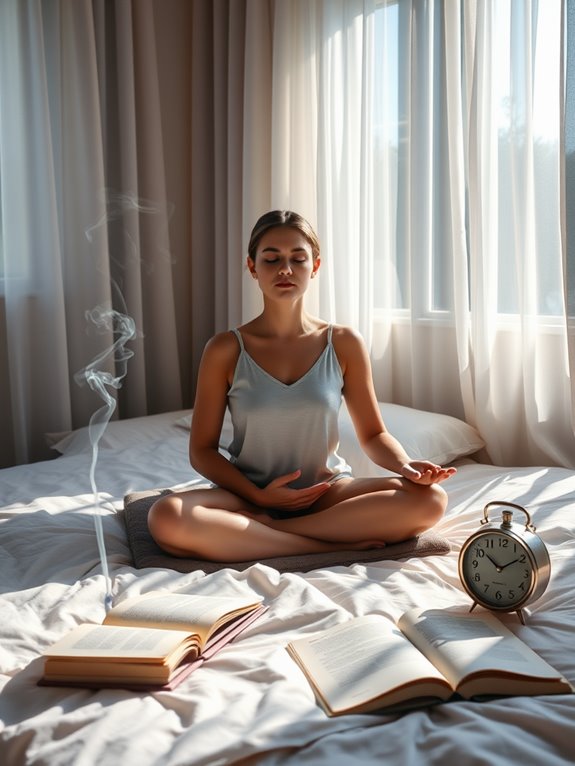
After establishing a calming bedtime routine, you can enhance your nighttime relaxation by incorporating deep breathing techniques.
Focus on breath awareness as you lie down, allowing your thoughts to drift away. Start with diaphragmatic breathing: inhale deeply through your nose, letting your abdomen expand, and then exhale slowly through your mouth. This practice not only calms your mind but also activates your body’s relaxation response. Aim for a rhythm, counting to four as you breathe in, holding for four, and exhaling for six. Incorporating herbal teas like chamomile or peppermint can further aid in creating a soothing environment conducive to sleep. Additionally, practicing biofeedback techniques can help you better understand your body’s relaxation signals and improve your mindfulness. Using calming essential oil blends with 100% pure oils can also enhance the relaxation experience during your deep breathing sessions.
This structured approach helps you release tension and promotes restful sleep. By consciously engaging in deep breathing, you’ll create a serene atmosphere, paving the way for a peaceful night’s rest and rejuvenation. Additionally, integrating breathwork techniques into your routine can further enhance your emotional resilience and overall well-being. Incorporating adjustable firmness in your meditation cushion can also improve comfort during relaxation practices, contributing to better sleep quality.
Engaging in Guided Meditation
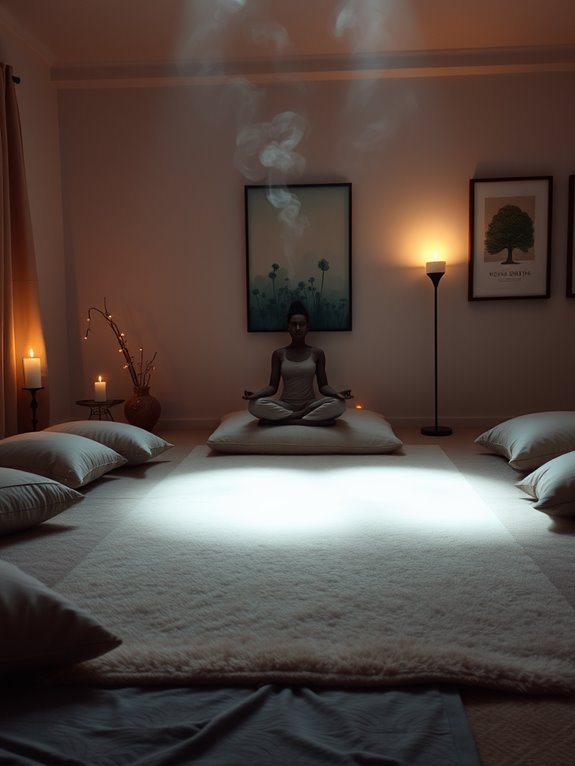
While you settle into bed, engaging in guided meditation can transform your nighttime routine into a deeply relaxing experience.
By using mindfulness apps, you can easily access a variety of guided imagery sessions designed to help you unwind. These sessions often focus on serene landscapes or calming narratives, steering your mind away from daily stressors and toward tranquility. Additionally, many of these sessions incorporate scientific insights that support their effectiveness in promoting relaxation. Incorporating guided imagery audio tracks can enhance your experience, allowing for deeper relaxation and mental clarity. For instance, the Ultimate Health and Wellness Gift Set offers a variety of meditations specifically aimed at alleviating stress and promoting sleep.
As you listen, pay attention to your breath and visualize the soothing imagery presented. This practice not only promotes relaxation but also enhances your overall mindfulness, making it easier to drift off to sleep. Incorporating guided meditation into your nightly ritual can considerably improve your rest, leaving you refreshed and ready for the day ahead. Additionally, many guided meditation journals provide structured guidance that can support your mindfulness journey. These journals often include journaling prompts that foster emotional balance and personal growth.
Incorporating Gentle Stretching or Yoga
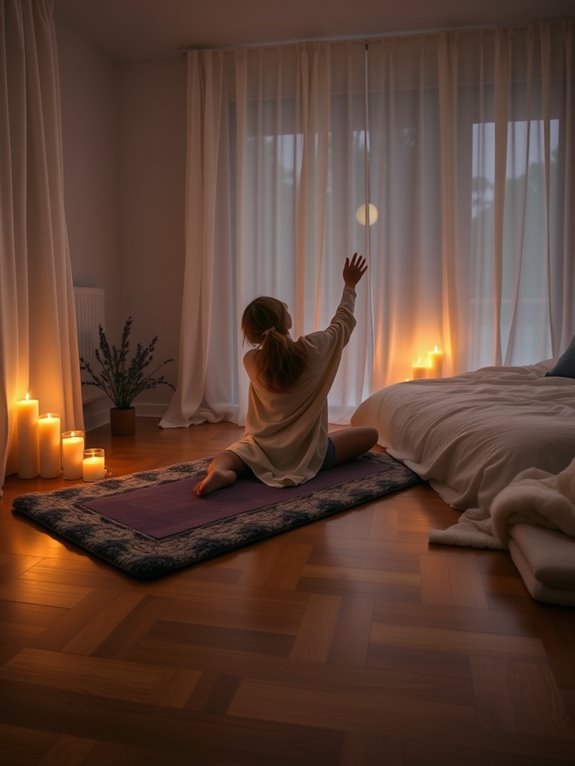
Incorporating gentle stretching or yoga into your nighttime routine can greatly enhance your relaxation and overall well-being. By practicing simple poses, you’ll not only relieve tension from the day but also prepare your mind and body for restful sleep. Additionally, using an acupressure mat during your stretching can further promote relaxation by stimulating key pressure points. Research has shown that mindfulness practices can significantly improve sleep quality, making this an essential part of your evening routine. Regular use of acupressure mats can reduce pain by up to 60%, making them an effective tool for enhancing your nighttime stretching routine. Moreover, incorporating foam rollers can also aid in muscle recovery, creating a more comprehensive approach to relaxation. Handheld massagers, with their multiple nodes and adjustable speeds, can also complement your stretching routine by effectively relieving muscle tension. Let’s explore some easy stretches and their benefits to help you wind down effectively.
Benefits of Evening Stretching
As you wind down your day, incorporating gentle stretching or yoga into your evening routine can considerably enhance your overall well-being. Engaging in these practices not only promotes relaxation but also allows you to discover unique products that can complement your mindfulness journey. Additionally, exploring specific mindfulness tools can further enrich your experience and provide you with new ways to engage your body and mind.
Evening flexibility not only promotes muscle relaxation but also prepares your body for restorative sleep. Engaging in regular stretching can also improve your balance and core strength, which is beneficial for overall physical health. Resistance bands can be an excellent addition to your stretching routine, providing customizable resistance for varied workouts.
Here are three key benefits of evening stretching:
- Reduces Tension: Gentle stretches help alleviate the physical stress built up throughout the day, allowing your mind to shift to a calmer state.
- Enhances Sleep Quality: By relaxing your muscles, you signal to your body that it’s time to unwind, promoting a deeper sleep.
- Improves Flexibility: Consistent evening stretching increases your range of motion, making you feel more agile and comfortable in your body.
Moreover, incorporating tools like Pilates rings can further enhance your stretching routine by adding resistance and improving muscle tone.
Embrace these benefits tonight for a more peaceful rest!
Simple Yoga Poses
To unwind effectively at the end of your day, practicing simple yoga poses can be a game-changer for your nighttime routine. Incorporating gentle stretching into your evening allows you to release tension and prepare your mind and body for rest. Bedtime poses like Child’s Pose, Legs-Up-the-Wall, and Seated Forward Bend are perfect for promoting relaxation. These poses not only enhance flexibility but also provide significant yoga benefits, such as promoting mindfulness and improving sleep quality. As you breathe deeply, you’ll find your worries begin to fade, creating a serene environment conducive to sleep. Additionally, discover unique products that can help enhance your yoga experience, such as mats and props designed for comfort and support. Engaging in mindful practices like yoga before bed can lead to a more restful night’s sleep, especially when complemented by durable foam props that provide additional comfort and support during your practice. Using tools like stretching straps can further enhance your flexibility and aid in recovery after your yoga sessions.
Utilizing Aromatherapy for Relaxation
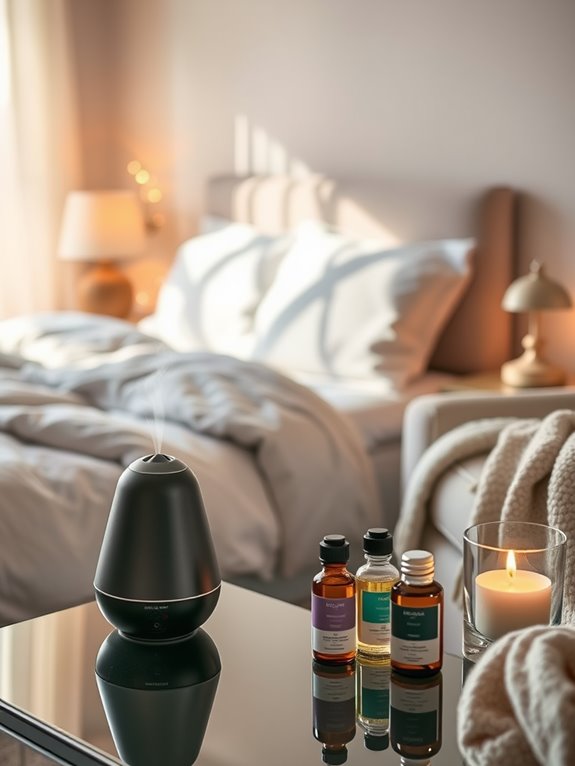
Aromatherapy can be a powerful tool for relaxation, offering a simple way to unwind after a long day.
By incorporating essential oils into your bedtime rituals, you can enhance your mood and promote stress relief. Portable essential oil diffusers are an excellent option for enjoying aromatherapy on-the-go, allowing you to create a calming environment wherever you are.
Here are three effective diffuser techniques to create calming fragrances:
- Lavender and Chamomile: This soothing scent combination promotes tranquility and deep sleep.
- Cedarwood and Ylang-Ylang: Known for their grounding properties, these oils help alleviate anxiety and foster a serene atmosphere.
- Bergamot and Frankincense: This uplifting blend offers mood enhancement while providing a warm, comforting aroma. Additionally, regular cleaning is essential to maintain optimal performance and prolong the lifespan of your diffuser.
Experiment with these calming fragrances to design sensory experiences that prepare your mind and body for restful nights. Additionally, using a diffuser with auto shutoff features can enhance safety while you sleep, ensuring a worry-free aromatherapy experience.
Journaling to Clear Your Mind
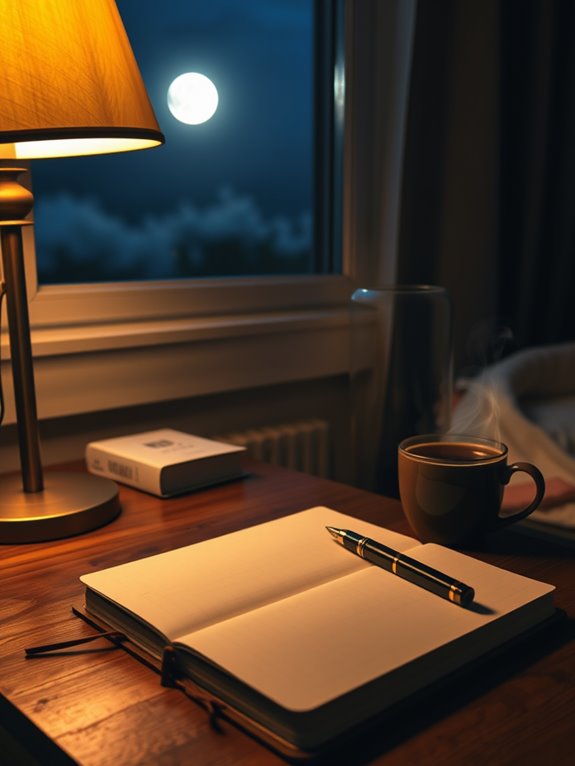
Journaling can be a powerful tool to clear your mind and promote relaxation before bed.
By putting your thoughts on paper, you not only release stress but also gain clarity about your emotions and experiences.
Let’s explore the benefits of journaling and some effective techniques to make the most of this practice.
Benefits of Journaling
Many people find that dedicating just a few minutes each night to journaling can considerably clear their minds. This practice offers numerous benefits that contribute to your overall well-being:
- Emotional Release: Reflective writing allows you to process feelings, reducing stress and anxiety.
- Goal Setting: Writing down aspirations cultivates mindful awareness and helps track personal growth.
- Daily Gratitude: Regularly noting what you’re thankful for enhances memory retention and fosters a positive mindset.
Through creative expression and self-discovery, journaling transforms your thoughts into clarity, paving the way for restful nights.
Effective Journaling Techniques
To fully harness the benefits of journaling, implementing effective techniques can make all the difference in clearing your mind.
Start by using creative prompts that inspire fresh thoughts and spark your imagination. For instance, ask yourself, “What am I grateful for today?” or “What challenges did I overcome?” These questions can help you focus on positive aspects of your life.
Additionally, incorporate reflective questions like, “What did I learn today?” or “How can I improve tomorrow?” to deepen your self-awareness.
Set aside dedicated time each night to write without distractions, allowing your thoughts to flow freely. This practice helps declutter your mind, paving the way for a restful night’s sleep and a more peaceful state of being.
Creating a Calming Sleep Environment
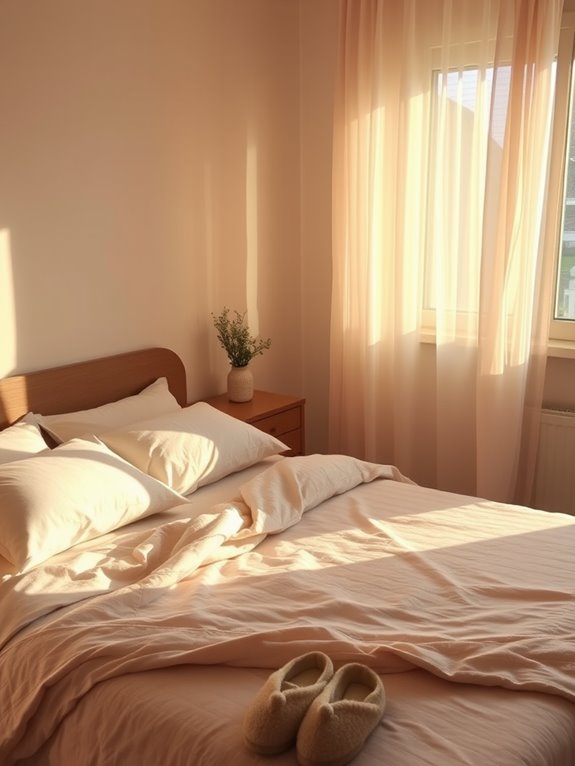
Creating a calming sleep environment can greatly enhance your ability to unwind and drift off to sleep. Here are three innovative tips to transform your space into a restful haven:
- Incorporate Sleeping Sounds: Use a white noise machine or calming sound app to drown out distractions. Nature sounds or soft music can create a soothing atmosphere.
- Opt for Cozy Bedding: Invest in high-quality sheets and pillows that feel good against your skin. Choose calming colors and textures to promote relaxation.
- Control Light Levels: Use blackout curtains or eye masks to block out unwanted light. Dimming your lights an hour before bed signals your body that it’s time to wind down.
Limiting Screen Time Before Bed
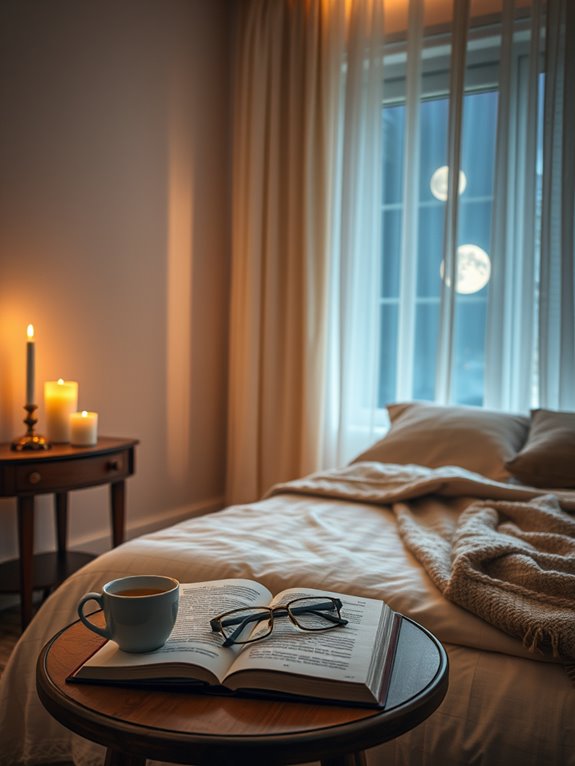
While it’s tempting to scroll through your phone or binge-watch your favorite shows at night, limiting screen time before bed can greatly improve your sleep quality.
The blue light emitted from screens interferes with your body’s production of melatonin, the hormone responsible for sleep. By reducing screen time at least an hour before bed, you enhance your sleep hygiene, making it easier to drift off peacefully.
Instead of reaching for your devices, consider alternatives like reading a book or practicing relaxation techniques. Creating a digital curfew will help signal to your brain that it’s time to unwind.
Ultimately, prioritizing this practice not only boosts your sleep quality but also contributes to your overall well-being. Embrace the night with mindfulness!
Frequently Asked Questions
How Long Should I Practice Mindfulness Before Bed?
You don’t need a long time to practice mindfulness before bed. Aim for about 10 to 20 minutes as part of your bedtime routine.
This duration allows you to engage effectively with relaxation techniques, helping you unwind and prepare for sleep. Focus on breathing exercises or guided meditations during this time.
Consistency is key, so make it a nightly habit to enhance your overall rest and well-being. You’ll notice the benefits in no time!
Can I Combine Mindfulness With Sleep Aids?
Absolutely, you can combine mindfulness techniques with sleep aids to enhance sleep aid effectiveness.
By practicing mindfulness, you calm your mind and reduce anxiety, which may allow sleep aids to work better.
However, it’s crucial to find a balance.
Experiment with different mindfulness practices, like deep breathing or guided imagery, alongside your chosen sleep aid.
This innovative approach could lead to deeper, more restorative sleep while maximizing the benefits of both strategies.
What if I Can’t Quiet My Mind?
If you can’t quiet your mind, don’t worry—you’re not alone.
Try mindfulness techniques like deep breathing or progressive muscle relaxation to help ground yourself. Engaging in calming practices, like gentle stretching or visualizing a peaceful scene, can also redirect your thoughts.
Are There Specific Mindfulness Apps for Sleep?
Imagine a serene night sky, where each star represents a moment of peace you can capture with the right tools.
There are several mindfulness apps designed specifically for sleep. Apps like Calm and Headspace offer guided sleep meditations and relaxation techniques that can gently lull your mind into tranquility.
How Does Diet Affect Mindfulness and Sleep?
Your dietary choices play an essential role in shaping your sleep quality.
When you practice nutritional mindfulness, you become aware of how specific foods impact your rest. Eating heavy meals too close to bedtime can disrupt your sleep, while lighter, nutrient-rich options promote better rest.
Pay attention to food timing; a well-timed snack can enhance your relaxation, making it easier to drift off.
Conclusion
By incorporating these nighttime mindfulness practices into your routine, you can greatly enhance your sleep quality and overall well-being. Imagine how restful your nights could be if you took just a few moments each evening to unwind and connect with yourself. As you establish a calming environment and embrace techniques like deep breathing or journaling, you’ll find it easier to drift off peacefully. Why not prioritize your rest tonight and discover the transformative power of mindfulness?

